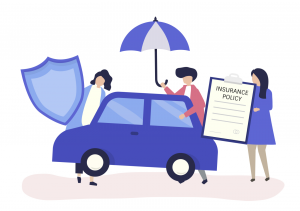What Should Your Renters Insurance Cover?
Well, how much should you get? You should have enough Renters Insurance to replace all of your personal possessions in case a fire, burglary, or other disaster happens. To figure out the value of all your things, take an inventory of your home, a list of all your possessions along with their value.
Replacement cost or cash value? The differences between those two are strong: actual cash value includes depreciation--the loss of value an item has over time; whilte replacement value may cost a bit more to have, but if your things are destroyed, it will cover the cost for either something new or something that has actually appreciated in value over time.
What situations are covered? Renters insurance covers you for losses from crimes such as break-ins and robberies, catastrophes such as fire and the smoke damage, or windstorms and lightning, and also things such as water damage from a burst pipe, or even explosion. (Flood and earthquake coverage are separate, though).
What’s the deductible? That part is easy: it’s the amount of money you pay out before the insurance coverage kicks in. So if you have a $500 dollar deductible and $6,000 of loss, the first $500 is on you, and insurance will cover the remaining $5,500. Generally speaking, the higher the deductible, the lower the premium cost.
What about really expensive items? If you own expensive items, such as collectibles, musical instruments, jewelry, furs, or sports equipment, you’ll want to think about getting what’s known as a floater. A “floater” is a separate/additional police that allows you to protect those expensive and harder to replace items.
What about outside the home? It depends on the policy, but most of them include “off-premises coverage” which means exactly what it says: belongings outside your home are covered against the same disasters, including property stolen from a hotel room or a car, for examples.
Is there liability protection? Yes. Renters insurance covers you against lawsuits for bodily injury or damage to property done by you, your family members, or even pets. It will cover the cost of your court defense, up to your policy limit, of course. There should also be no-fault medical coverage, which will allow someone who gets injured to send their medical bills directly to the insurance company so bills can be paid without having to go through with a lawsuit.
What’s enough insurance? The amount of liability coverage should be enough to protect your material and financial assets in case someone brings a lawsuit against you.
What’s ALE and what does it cover? ALE stands for additional living expenses, which covers you if your home is destroyed by an insured situation, and you need to live elsewhere for a while. Included in this would be hotel bills, temporary apartment rentals, meals, and other expenses you wouldn’t have incurred if you were still able to live in your home.
How much will ALE cover? Although there are limits to the total amount that will get paid and/or time limits that specify how long you’re eligible to receive ALE, the policy generally reimburses the full difference between your additional living expenses and your normal living expenses--so be sure you’re comfortable with your policy limits.
Remember that if you have other policies as well, such as car insurance, you can bundle and save!
Click here and contact us today!
Who Needs Renters Insurance?
Who Needs Renter’s Insurance?
You do. Whether you rent a house or an apartment, the fact is that should a fire or other disaster strike, your landlord’s insurance will only cover part of the cost, and if there’s a theft or robbery, likely none of that will be covered. But Renters Insurance will help you.
No matter the size of your dwelling, you need to protect yourself financially--and that’s where renters (or tenants) insurance comes in.
This insurance will protect you in several ways:
Coverage of your personal possessions, from your bed to you books and everything in between, liability if, say, someone trips and falls within your apartment, and if something catastrophic DOES happen, it can provide additional living expenses (also known as ALE).
Renters insurance isn’t the same as homeowners: it won’t cover the building or the structure of the apartment--that’s the landlord’s responsibility.
Covering your personal belongings is a key component of this coverage, but it will also protect you in case of fire, theft, or a whole bunch of other unfortunate and unforeseen events. In fact, most coverages will protect your items in case of fire and smoke, lightning and windstorm, theft and vandalism, certain types of water damage, like if say, your neighbor leaves the water running when they go away for the weekend--flooding your apartment, or a pipe bursts, damaging your possessions.
As you can see, for about what it costs for a decent sandwich, you can protect yourself and all of your belongings from (or at least most of them) from permanent loss.
And better yet, there are discounts available, too. From bundling with you car insurance, to having a security system, having good credit, passing certain key birthdays and even using deadbolt locks, there’s a variety of ways to save available to you.
Protect yourself, your home--and the things that make it home: the items you’ve worked so hard for and the people you have within it.
Get your quote today.
You’ve Been In An Accident – Now What?
2021
You've Been In An Accident
First
Check yourself for injuries and if you have one, call 911 or ask someone to do that for you. And, if you think it’s something serious, try to stay as still as you can and wait for emergency services.
Next:
If you find your able enough to, check the other folks in your vehicle, and if anyone’s hurt, call emergency services right away--or ask a bystander of they can call for help.
Then:
If it’s at all possible to move the car AND it presents a hazard where it is, pull to the side of the road. If it’s undriveable, leave it where it is, and get yourself and anyone else who’s also able to move, to safety.
CALL 911!
Yes, if you haven’t done it yet, call the police. It doesn’t matter if the accident is major or minor--and Illinois requires drivers to report any accident that involves “death, bodily injury or property damage over $500” — no matter who caused the accident.
The officers will fill out an accident report as well as document the scene (but if they can’t get there for whatever reason, it’s up to you to go to the nearest police station an complete the report yourself!)
Wait:
Turn off the engine, turn on the hazard lights, if you’re able to do so, set and light road flares if you have them (so other vehicles know to slow down)
Information Exchange
Once everyone is safely away from oncoming traffic, trade contact and insurance information with the other driver. This is what you need:
Full name and contact information
Insurance company and policy number
Driver’s license and license plate number
Type, color, and model of vehicle
Location of the accident
Remember:
Do your best to be level headed and DON’T discuss fault when going over the facts with the other driver. The insurance adjuster who reviews your claim will determine that based on an inspection of all the damages involved as well as the supporting documentation--such as the police report--and any photographs from the scene.
Paperwork/recordkeeping
You need to protect yourself, not just on the scene, but after, so you’ll need to:
Get the name and badge number of all the responding officers
Ask them where you can get a copy of the accident report (you’ll need it when you file your claim)
Take pictures--get different angles so you can see the damage done to everything (cars, fences, poles--if it got hit, you want a picture).
Take names--and addresses, including those of passengers in other vehicles, AND the names and contact information of any available witnesses.
Start Your Claim
If things are safe enough on the scene, call your agent, or start the process via the website on your phone and someone can tell you exactly what you’ll need to file your claim.
Accidents are stressful and even frightening, but if you can follow these steps, it will help protect you from unwanted and intended consequences, and you can focus not only on the health and well being of you and anyone else involved, but also in getting your vehicle repaired and getting back on the road as soon as possible.
Illinois Insurance Minimums
2021
Illinois Insurance Minimums
Although you may have heard that Illinois used to have some of the lowest minimums in the country, that’s no longer true--because if you look around, you’ll discover that no matter where you are, whether you’re driving along the Lake or down the Kennedy, more than one in ten of your fellow drivers, doesn’t have insurance - 13.7% in fact, and that’s a financial disaster for someone who’s been injured by an uninsured driver.
So, if you’re a driver in the Land of Lincoln--and especially in Chicago--the state of Illinois says you’ll need to have the following coverage at the very least.
$25,000 for bodily injury (one person)
$50,000 for more than one person per occurrence
$20,000 for property damage
You’ll also have to carry uninsured motorist insurance as well, although it won’t cover property damage--you’ll need collision for that. You’ll also have underinsured motorist insurance packed into the uninsured if your accident is caused by a negligent motorist who doesn’t have enough liability insurance to cover the damages.
There are options available to you, too! Find out and get your quick quote here: https://bit.ly/YouNeedInsurance
**all information from the Insurance Information Institute
Are You A Safe Driver?
2021
Are You A Safe Driver?
Well, of course you are, or at least, you definitely do your best. After all, it’s not just you in the vehicle or on the road. No matter how great of a driver you are, it’s always a good idea to review best practices from time to time--after all, it’s up to each of us to do our best to keep ourselves and others safe.
Here’s a great checklist:
Buckle up! Before you even put the key in the ignition, put your seatbelt on. Not only will it protect you more in the event of an accident, in some cities and states, you can be fined for not wearing it.
Know your way. If you plan your route ahead of time, you won’t have to attempt to figure out where you’re going at the same time you’re operating a motorized vehicle.
Be Aware. Stay alert and pay attention, not just to your actions, but also those of other drivers around you while you’re driving.
Be sober. Never drive under the influence, whether it be alcohol, drugs, or even certain medications can affect your perceptions and reactions times.
Don’t guess. Sometimes we think we know what the other driver should do, or assume that we know what their next move will be--but we don’t.
Be weather wise. When you’ve got less than ideal conditions, such as fog, or snow, or rain, be extra cautious and be sure to follow your local guidelines for driving in such conditions.
The rules of the road. In addition to all speed limits, obey stop signs and traffic lights, as well as speed limits. Remember that yellow lights notify you to slow down and prepare to stop (they never mean go very fast!).
Stops signs. They mean it. Sometimes, others don’t. But you should, even if you don’t think other cars are around--it’s the one time you don’t expect it that is when something potentially awful can happen.
Be a good communicator. Use your signals every time you’re supposed to--before lane changing or turning.
But still, DON’T TEXT AND DRIVE! It’s that simple--just don’t.
Keep focused. It’s not just texting--talking via cell phone, eating, changing music sources, even discussion with other passengers can be distracting, so keep that to a minimum.
Car Safety. Make sure you’ve got plenty of gas in your tank, your tires are in good condition, and all the lights and wipers are working properly.
Most importantly, be patient. Don’t rush to get where you’re going. After all, if you’re involved in an accident, it’ll take you even longer.
When your car is safe, you know where you’re going and how to get there, and you and your passengers are focused on the journey, all that’s left is to enjoy the drive!
Why Do We Need Car Insurance?
2021
Why do we need car insurance? It’s because life can be random
It’s true. Sooner or later, an accident will happen. And with that, comes levels of responsibility, also known as liability: money due for any damages caused, and that can be a lot. And while states vary on what and how much is covered, it’s coverage that will provide financial relief for victims of damages.
In order to legally register and drive your vehicle, each state (except for New Hampshire--but there you have to prove that you are financially capable of paying for an accident should it happen) requires that you maintain at least a minimum level of liability insurance, and if you leased or are paying off a vehicle, they might require a higher minimum along with additional coverages, such as collision and comprehensive.
There’s a great benefit to having insurance: protection. With the right plan and coverage, you can protect you and your family from huge expenses! It’s a small investment now that helps avoid expenses in the future - and you can take care of any physical damage - to property or people - that may arise. And if you have a good policy, then they can help you with managing costs of all the unexpected things that can arise after an accident.
Car insurance brings you peace of mind, knowing you and those around you, are protected. It’s easy--get your quote here
***All information comes from the Insurance Information Institute.

What’s SR22?
February 2021 at 10:00AM CST
What's SR22 and why do you need it?
SR22 Insurance--sometimes called “Financial Responsibility”--isn’t actually car insurance. It means that the state Department of Motor Vehicles (DMV) office wants to be notified that you have active liability car insurance. It’s the insurance company that notifies them.
The various state DMVs require them in order for a person to have their driving privileges reinstated after an incident such as an uninsured car accident, or a conviction of a traffic related offense (like a DUI). Some states require them for up to three years for a driving without insurance, or driving with a suspended license convictions, and even up to five years for a DUI.
SR22 is NOT an insurance policy. It’s a form that your insurance company files for you with the state so that you CAN get insurance, and get back on the road.
At Consumers Insurance, we as a car insurance company offer best-in-class, low-cost, and effective SR22 car insurance solutions for all your car insurance needs. We make it easy by using the best-in-class electronic submission system, for your best in class, low-cost, and effective SR22 Insurance Policy. Also, we file your SR22 directly with the Secretary of State’s office, so you don't have to, usually within 72 hours.
Consumers Website Launch
Consumers Has A New Website!
2021 at 10:00AM CST
Consumers Insurance-Insurance for Consumers, by Consumers-announces a revamped website, launching February 15th. Readable in both English and Spanish (a toggle at the upper right hand of the page allows the user to switch), and the new look sets the foundation for a robust digital presence, while the new quoting portal (https://lnkd.in/eziav6T) boasts a secure payment system. Redesigned and revamped, the new website has secure functionalities to increase customer’s convenience and ease of use.
It also adapts: mobile devices as well as desktops receive a custom view. Whatever the device, the website is accessible.
Most importantly, people are now able to quote directly: the brand-new quoting portal enables people to both purchase a policy and sign documents online, so folks can inquire and start a brand new policy anytime they want, and Consumers direct payments system makes individual’s information more secure than ever.
New social media links on the page expand channels of communication, enabling even further customer interaction, and sharing content that is relevant to the customer.
Consumers Insurance: proudly serving the Chicagoland area for over three decades. Get your quick quote here: https://lnkd.in/eziav6T #insurance #communication


